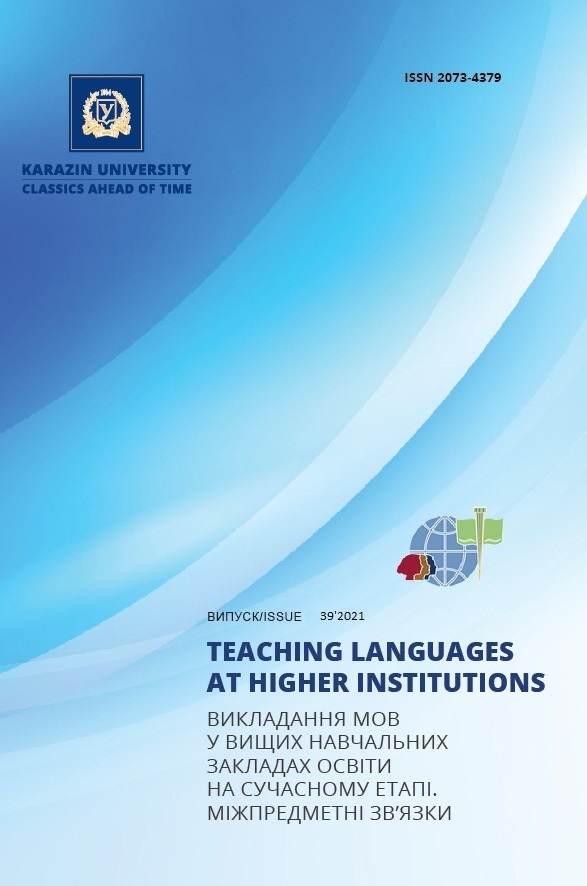Development of the ability for empathy in students with clip thinking
Abstract
The article discusses methods of organizing the educational and research activities of students with clip thinking to develop their empathic abilities during Ukrainian classes. The author proposes drills that contribute to the expansion of the cognitive and cognitive sphere of students, development, analysis, and use of emotional and sensory experience of a person. Ideas of humanization and humanities-oriented approach retain their relevance and they have not been sufficiently implemented in the system of higher education. It is important to form the humanistic mentality of modern specialists, which should become an integral part of their professionalism, along with the development of a system of value attitudes. The Ukrainian language has an educational potential for the development of moral and ethical qualities of the individual. It is necessary to form appropriate knowledge and skills in students, fostering a personal attitude to the content of education, increasing the level of empathy formation, and manifesting a deep emotional attitude to the discussed moral problems and moral value activity as a result of the application of the described methods of organizing educational and research work. An optimally organized process of teaching the Ukrainian language can prepare a student’s personality for a tolerant perception of foreign culture, for tolerance based on the developed empathy, for removal of national stereotypes and prejudices. Empathy is a condition that allows individuals to successfully solve new problems that may arise in their relationships with people. And the empathic type of intercultural communication helps to find the best ways and means for organizing mutual understanding between partners during a dialogue of cultures. Prospects for further research consist in the development of test methods that trace the dynamics of psychological phenomena of personality, a level of development of empathic abilities, to actively use them in the educational process.
Downloads
References
Afanasjeva, N.D. (2019). Vzaimosvjaz empatii i obuchenija studentov v vuze [The relationship between empathy and student learning at the university]. Koncept: filosofija, religija, kultura [Concept: philosophy, religion, culture ]. 2 (10), pp. 135–143 [in Russian].
Gusarchuk, A.O. and Kosmina, V.Yu. (2016). Consideration of empathy as a component of emotional intelligence in teaching Russian. Teaching languages at higher educational establishments at the present stage. Intersubject relations. Kharkiv: V.N. Karazin Kharkiv National University, 29, pp. 27–34 [in Ukrainian].
Meshherjakov, B.G. and Zinchenko, V.P. (2004). Bolshoj psihologicheskij slovar [Large psychological dictionary]. Moscow: Olmapress [in Russian].
Soloveva, G.V. Formirovanie empatii v processe izuchenija inostrannogo jazyka [Formation of empathy in the process of learning a foreign language]. Available at: http://elar.uspu.ru/bitstream/uspu/402/1/ konf000028.pdf [Accessed 5 July 2021] [in Russian].
Solona, Yu.O. (2019). Rozroblennya pidhodiv shhodo transformaciyi “klipovogo” myslennya majbutnih uchyteliv biologiyi sposobamy organizaciyi navchalno-doslidnyczkoyi diyalnosti u fahovij pidgotovci [Development of approaches to the transformation of “clip” thinking of future biology teachers by organizing educational and research activities in professional training]. Innovacijna pedagogika. 13, V. 1, pp. 156–163. Available at: http://www.innovpedagogy.od.ua/archives/2019/13/ part_1/36.pdf [Accessed 6 July 2021] [in Ukrainian].
Torubarova, I.I. (2013). Razvitie sposobnosty k empatii v processe obuchenija inostrannym jazykam v medicinskom vuze [The development of the ability for empathy in the process of teaching foreign languages at a medical school]. Vestnik VGU. Serija: Lingvistika i mezhkulturnaja kommunikacija, 2, pp. 224–227. Available at: http://www.vestnik.vsu.ru/pdf/lingvo/2013/02/2013-02-44.pdf [Accessed 8 July 2021] [in Russian].
Fenomen empatiyi u spilkuvanni [The phenomenon of empathy in communication]. Available at: https://ru.osvita.ua/vnz/reports/psychology/ 10108/ [Accessed 1 July 2021] [in Ukrainian].

